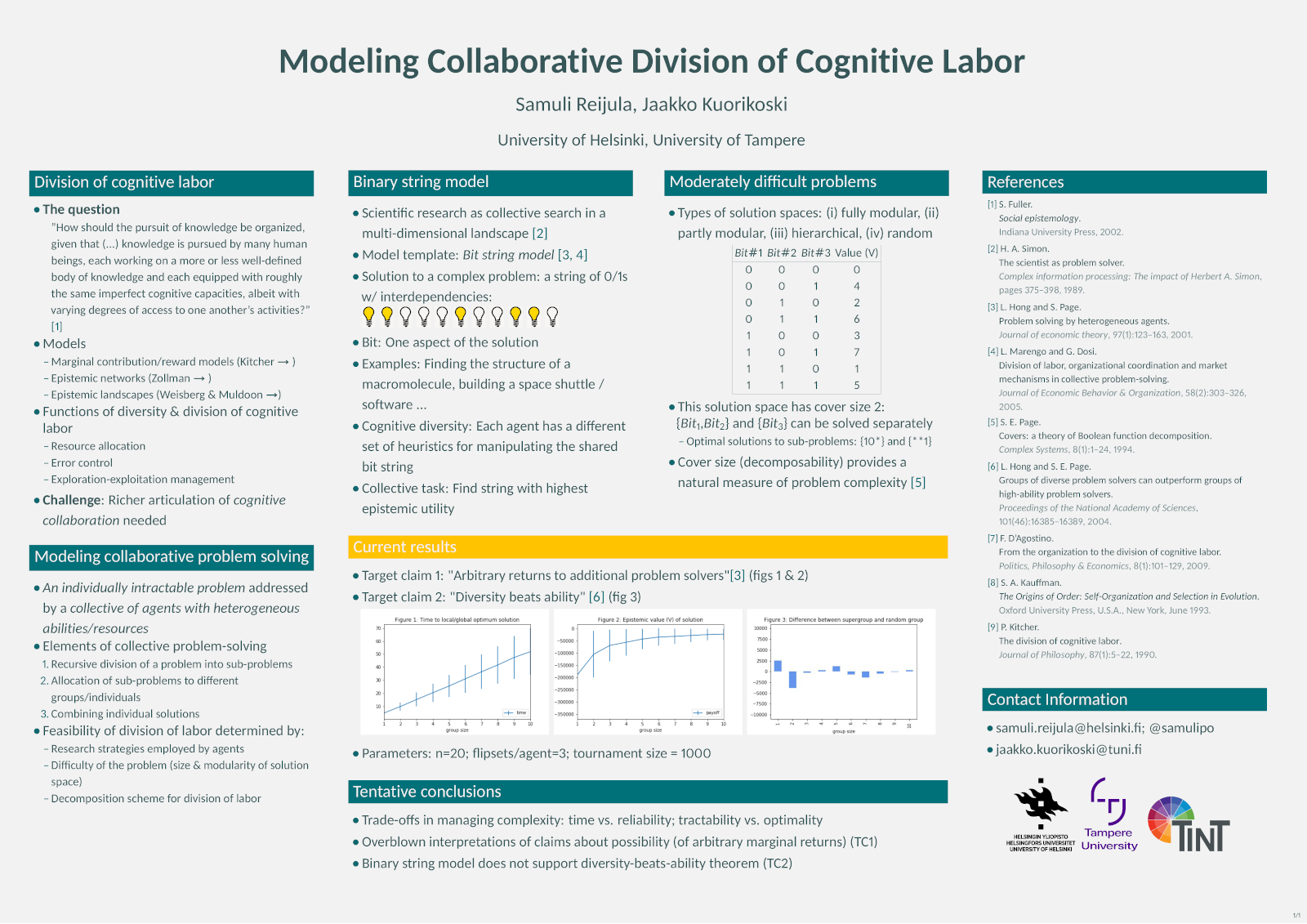Projects
Institutional Epistemology workshops (INES)
Since 2022, Säde Hormio, Raul Hakli and I have been the core organizing team of Institutional Epistemology workshops (2022 and 2023). INES 2025 is coming up in June 2025. More information here.
Some of our keynote speakers: Elizabeth Anderson, Helen Beebee, Jessica Brown, Cailin O’Connor, Gloria Origgi, Kristina Rolin, Daniel Steel, Alison Wylie and Kevin Zollman.
European network for the Science of Science (EUROSCISCI)
In 2022-2023, together with Pantelis Analytis and Jacob Habinek, I organized a series of European workshops on the science of science. More here. In 2024 the network metamorphosed into the European Network for the Science of Science, EUROSCISCI.
Modeling the republic of science: Collaborative problem solving and collective rationality in scientific inquiry (2020-2025)
In 2020-2025 my research is funded by the Academy of Finland. The personal academy-fellow research project focuses on understanding collaboration in scientific research.

Abstract
“Art is I, science is we” – Claude Bernard
Science is a deeply collaborative enterprise. Research is increasingly conducted by teams, and the reasons for many of its successes (e.g., mapping the human genome) and failures (e.g., replication crisis) are best understood by viewing science as a social system. The general aim of the project is to understand successful cognitive coordination in scientific communities: How should inquiry be organized so that the collaborative pursuit of knowledge is efficient, progressive and reliable?
Although the recent modeling work in the philosophy of science has provided insight into the socio-epistemic dynamics of scientific inquiry, scientific collaboration and epistemic interdependence in problem solving are still poorly understood topics. Instead, our models (both theoretical as well as those underlying institutional design) often emphasize competition as the institutional logic of research. Most of the current modeling approaches cannot be used to represent cases of collaborative problem solving, in which a complex research problem must be subdivided into more tractable tasks distributed across different individuals or teams within the scientific community. Furthermore, although the case-study-based literature on scientific collaboration is extensive, it alone does not provide a sufficient basis for systematic theorizing about the principles of cognitive collaboration and collective rationality in science.
My project addresses these shortcomings by combining philosophical analysis with computational modeling. First, it introduces two model templates for studying scientific collaboration (restless bandits; binary string model). Second, by providing an account of the epistemology of computational modeling, it positions the modeling-based results with respect to the broader philosophical and interdisciplinary literature on scientific collaboration. The questions addressed by the project include: Which patterns of communal information exchange are desirable – can too much communication between scientists be epistemically harmful? When do diverse problem-solving groups outperform more skilled but less diverse ones? How does non-modularity of research problems hinder success in multidisciplinary research teams?
Publications
Reijula, Samuli, Jaakko Kuorikoski, Miles MacLeod (2023). The division of cognitive labor and the structure of interdisciplinary problems, Synthese 201:214. [pdf, open access]
Reijula, Samuli and Jaakko Kuorikoski (2022). Modeling cognitive diversity in group problem solving, in J. Culbertson, A. Perfors, H. Rabagliati & V. Ramenzoni (Eds.), Proceedings of the 44th Annual Conference of the Cognitive Science Society. [pdf]
Reijula, Samuli and Jaakko Kuorikoski (forthcoming, 2021). The diversity-ability trade-off in scientific problem solving. Philosophy of Science (PSA 2020/2021). [pdf]
Aydinonat, Emrah, Samuli Reijula and Petri Ylikoski (forthcoming). Argumentative landscapes: the functions of models in social epistemology. Synthese. [pdf]
Reijula, Samuli & Jaakko Kuorikoski (2019). Modeling epistemic communities, in M. Fricker, P.J. Graham, D. Henderson, N. Pedersen, J. Wyatt (eds.) The Routledge Handbook of Social Epistemology, 240-249. [link] [pdf]
Kyanoush Seyed Yahosseini, Samuli Reijula, Lucas Molleman & Mehdi Moussaıd (2018) Social information can undermine individual performance in exploration-exploitation tasks. COGSCI 2018: 40th Annual Conference of the Cognitive Science Society, 2470-2475. [pdf]
Pöyhönen, Samuli (2017). Value of cognitive diversity in science. Synthese, 194: 4519-4540. [pdf] [link] [online materials]